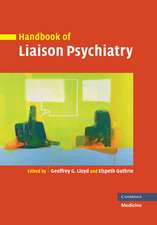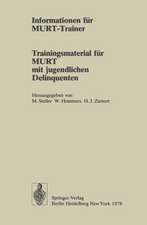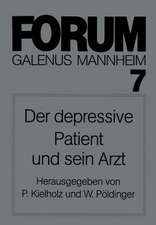Psychological Debriefing: Theory, Practice and Evidence
Editat de Beverley Raphael, John Wilsonen Limba Engleză Paperback – 11 oct 2000
Preț: 901.85 lei
Preț vechi: 949.31 lei
-5% Nou
Puncte Express: 1353
Preț estimativ în valută:
172.59€ • 187.41$ • 144.98£
172.59€ • 187.41$ • 144.98£
Carte tipărită la comandă
Livrare economică 22 aprilie-06 mai
Preluare comenzi: 021 569.72.76
Specificații
ISBN-13: 9780521647007
ISBN-10: 0521647002
Pagini: 388
Ilustrații: 3 b/w illus. 37 tables
Dimensiuni: 189 x 246 x 20 mm
Greutate: 0.82 kg
Editura: Cambridge University Press
Colecția Cambridge University Press
Locul publicării:Cambridge, United Kingdom
ISBN-10: 0521647002
Pagini: 388
Ilustrații: 3 b/w illus. 37 tables
Dimensiuni: 189 x 246 x 20 mm
Greutate: 0.82 kg
Editura: Cambridge University Press
Colecția Cambridge University Press
Locul publicării:Cambridge, United Kingdom
Cuprins
Overview: key issues in the conceptualisation of debriefing; Part I. Key Conceptual Framework of Debriefing: 1. Historical concepts and present patterns: stress management and debriefing; 2. Debriefing: its role in the spectrum of prevention and acute management of psychological trauma; 3. Briefing and debriefing: psychological interventions in acute stressor situations; 4. Traumatic stress and the concept of debriefing: theoretical frameworks and potential effects and other settings; Part II. Debriefing: Models, Research and Practice: 5. Critical incident stress debriefing: evolutions, effects and outcomes; 6. Debriefing with emergency services: critical incident stress management; 7. Debriefing and body recovery: war grave soldiers; 8. Debriefing and body recovery: police in a civilian disaster; 9. Debriefing after massive road trauma: perceptions and outcomes; 10. Debriefing and motor vehicle accidents: interventions and outcomes; 11. Debriefing with service personnel in war and peace roles: experience and outcomes; 12. Debriefing post disaster: follow-up after a major earthquake; 13. Debriefing after disaster; 14. Children and debriefing: theory, interventions and outcomes; 15. Debriefing adolescents after critical life events; Part III. Adaptations of Debriefing Models: 16. Delayed debriefing: after a disaster; 17. Debriefing in different cultural frameworks: experience with indigenous populations; 18. The concept of debriefing and its application to staff dealing with life threatening illnesses such as cancer, AIDS and other conditions; 19. Traumatic childbirth and the role of debriefing; 20. Debriefing staff after assaults by patients; 21. Multiple stressor debriefing as a model for intervention; Part IV. Debriefing Overview and Future Directions: 22. Concerns about debriefing: challenging the mainstream; 23. Is consensus possible about debriefing?; 24. Can debriefing work? critical appraisal of theories of interventions and outcomes with directions for future research; 25. A conceptual framework for mass trauma: implications for adaptation and intervention; Conclusion: debriefing: science, belief and wisdom; Index.
Recenzii
'At times truly horrific reading but fortunately tempered by the general opinion throughout the book that there is always the 'possibility of help, the recognition of hurt, the reality of hope' … This book certainly provides a wealth of theories, descriptions and experience, and as such could offer support to those psychiatrists working closely and regularly with trauma victims.' International Journal of Geriatric Psychiatry
'Two recurring themes are welcome and reassuring. The first is the need to target interventions to those needing help … and the second is that debriefing should not be compulsory. This support is uniformly well written and offers some chapters to provoke, others to reference and one to bore. it has international appeal, covers a range of trauma and will be appreciated by many professionals, not just those with a special interest in psychological trauma.' British Journal of Psychiatry
'The message of the book is the need to clarify, define, differentiate and test empirically. In a field which has not just great relevance but also a high profile, the book has done a valuable service by highlighting the key issues and going some way towards possible answers … Overall, however, this is a book that all those interested in stress and trauma will warmly welcome.' Sexual and Relationship Therapy
'Two recurring themes are welcome and reassuring. The first is the need to target interventions to those needing help … and the second is that debriefing should not be compulsory. This support is uniformly well written and offers some chapters to provoke, others to reference and one to bore. it has international appeal, covers a range of trauma and will be appreciated by many professionals, not just those with a special interest in psychological trauma.' British Journal of Psychiatry
'The message of the book is the need to clarify, define, differentiate and test empirically. In a field which has not just great relevance but also a high profile, the book has done a valuable service by highlighting the key issues and going some way towards possible answers … Overall, however, this is a book that all those interested in stress and trauma will warmly welcome.' Sexual and Relationship Therapy
Descriere
A balanced critical review of psychological debriefing by an eminent international team, published in 2000.

























